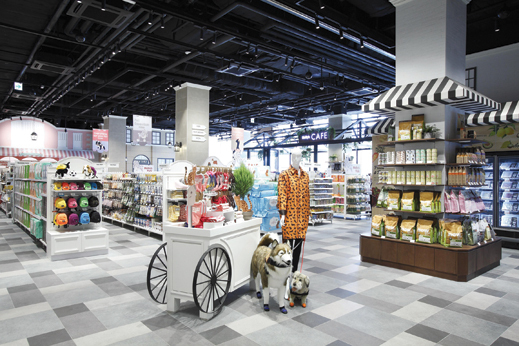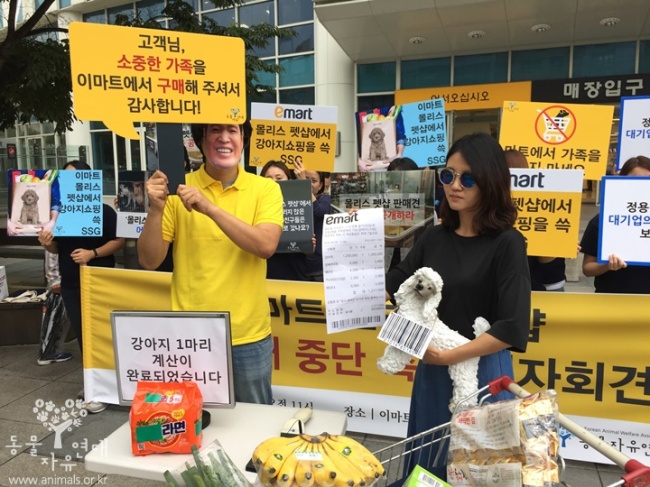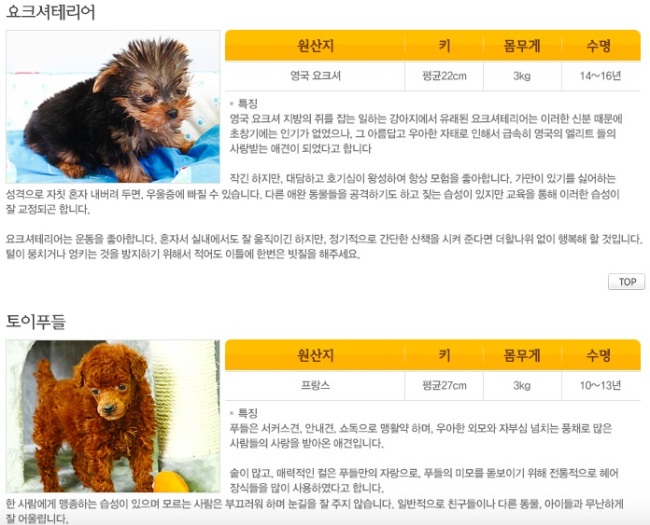[Feature] Amid growing pet market, sale of puppies at discount chains under scrutiny
Retailers see pet sales as growing business while activists say it breaches animal rights
By Kim Da-solPublished : Nov. 11, 2018 - 15:10
Inside a busy discount chain store in Jayang-dong, northeastern Seoul, puppies slightly over 1 year old are put together in plastic boxes with a bottle of water.
Most of the breeds sold at E-mart’s Molly’s Pet Shop are Maltese, Miniature Pinscher, Shih Tzu and Yorkshire Terrier, popular for their cuteness and appearance. The pet shop, named after Shinsegae Group Vice Chairman Chung Yong-jin’s dog Molly, is one of the outlets that provide premium pet care and sell pet products. But puppies are displayed by windows under beams of light, with neither registered licenses nor management records in place. Currently, 26 out of 35 E-mart stores sell puppies at these pet shops.
Most of the breeds sold at E-mart’s Molly’s Pet Shop are Maltese, Miniature Pinscher, Shih Tzu and Yorkshire Terrier, popular for their cuteness and appearance. The pet shop, named after Shinsegae Group Vice Chairman Chung Yong-jin’s dog Molly, is one of the outlets that provide premium pet care and sell pet products. But puppies are displayed by windows under beams of light, with neither registered licenses nor management records in place. Currently, 26 out of 35 E-mart stores sell puppies at these pet shops.

Under the Korean law, it is not illegal to sell pets at discount chain stores where people buy daily groceries. But pet shop owners are required to display their business registration certificates and management records on the animals they sell or keep, under the revised animal protection law. They are also obliged to separate wounded, aggressive, old or young animals from the others.
However, such requirements are often ignored, according to animal rights activists. The concept of selling animals at the most common commercial places in the country is absurd, they say. The activists have also accused stores and retail giants of objectifying animals. Such businesses cause impulsive purchases by customers, they claim, adding that discount chains should sell only pet products instead.
“It is impossible to see marts in other countries selling pets, not just pet products. Puppies are not products that can be sold at supermarkets. They should be considered as family members,” said Park So-yeon, a representative from an animal rights association, CARE.
Online petitions asking the presidential office Cheong Wa Dae to ban sales of animals at discount chain stores have been on the rise as well.
According to the Korean Animal Welfare Association, such discount stores have also been accused of failing to comply with the law pertaining to the proper treatment of animals.
The association released a statement earlier this year accusing E-mart’s Molly’s Pet Shop of mistreatment after its members witnessed a hamster eating a dead hamster during its inspections of 26 pet stores run by the discount chain.
This is not the first time that Molly’s Pet Shop has come under scrutiny. In 2012, its outlets in Bundang in Gyeonggi Province and Daejeon were found to have sold puppies under 2 months old.

In July, the Korean Animal Welfare Association released the results of their inspections of pet shops inside retail stores and claimed that all 26 stores inspected were found to have breached guidelines under the newly revised animal protection law.
Sixteen stores did not display basic information about animals for sale, such as species, gender, date of birth, vaccination, and other medical records. Ten stores did not display registered licenses as official resellers of animals.
E-mart, in response, said the inspections had taken place immediately after the revision of the law came into effect, therefore it was still trying to comply with the new legislation that was implemented without a grace period.
It is impossible to accept calls to immediately suspend the sale of pets at Molly’s Pet Shop, although the company is open to talks for the improvement of animal welfare at its shops, officials at E-mart told The Korea Herald.
Under Vice Chairman Chung’s direction, E-mart has been promoting a pet-friendly policy, even allowing customers to bring and walk their dogs inside Starfield shopping malls and Shinsegae Premium Outlets, they added.
Another discount chain Lotte Mart stopped the sale of animals inside its outlets last year. It has been promoting a campaign of adopting abandoned dogs.
“While the number of people with companion animals is reaching 10 million, seeing pets as products sold at stores is problematic. Discount chains are not suitable places to sell pets, considering that pets can be easily exposed to diseases without proper supervision or management. Young children, who tend to express curiosity by knocking on the glass container can also give stress to animals,” said Jeon Kyung-ok from the Korean Society of Animal Welfare Science.

The size of the South Korean pet and pet-related industry is valued at 2.2 trillion won ($1.9 billion), as of last year. Industry insiders expect the number to surpass 6 trillion won by 2020 due to the increasing number of Koreans who consider pets as companions, which makes it difficult for retail giants to ditch the pet retail businesses, according to market insiders.
By Kim Da-sol (ddd@heraldcorp.com)






![[From the Scene] Monks, Buddhists hail return of remains of Buddhas](http://res.heraldm.com/phpwas/restmb_idxmake.php?idx=644&simg=/content/image/2024/04/19/20240419050617_0.jpg&u=20240419175937)








![[From the Scene] Monks, Buddhists hail return of remains of Buddhas](http://res.heraldm.com/phpwas/restmb_idxmake.php?idx=652&simg=/content/image/2024/04/19/20240419050617_0.jpg&u=20240419175937)

![[KH Explains] Hyundai's full hybrid edge to pay off amid slow transition to pure EVs](http://res.heraldm.com/phpwas/restmb_idxmake.php?idx=652&simg=/content/image/2024/04/18/20240418050645_0.jpg&u=20240419100350)

![[Today’s K-pop] Illit drops debut single remix](http://res.heraldm.com/phpwas/restmb_idxmake.php?idx=642&simg=/content/image/2024/04/19/20240419050612_0.jpg&u=)